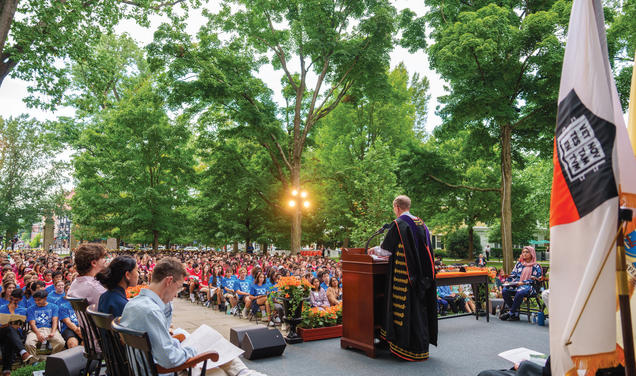Professor Ruha Benjamin Named Among 22 MacArthur Fellowship Recipients
The grant recognizes ‘creative individuals with a track record of excellence,’ according to the foundation

The MacArthur Foundation announced Oct. 1 that Ruha Benjamin, the Alexander Stewart 1886 Professor of African American Studies at Princeton, is among the recipients of the 2024 MacArthur Fellowship. Benjamin, who has taught at Princeton since 2014, was cited by the foundation for demonstrating “the importance of imagination and grassroots activism in shaping social policies and cultural practices” through her “critical analysis of innovation with attentiveness to the potential for positive change.”
Each of the 22 fellows in this year’s class will receive an $800,000 “no-strings-attached” award to be distributed in installments over the next five years. The aim of the program is to “identify extraordinarily creative individuals with a track record of excellence,” according to the foundation’s website.
When PAW spoke with Benjamin in 2019, she explained that her work focuses on “areas of inquiry that go unquestioned because we think of them as objective, as neutral, as asocial,” like science, technology, and medicine.
“At the heart of all my work is the invitation to imagine and craft the worlds we cannot live without, just as we dismantle the ones we cannot live within,” Benjamin said in the MacArthur announcement.
On X, formerly known as Twitter, Benjamin posted that she received the call from the Foundation announcing the award “the morning after a tense call with Princeton University officials investigating my support of students protesting the genocide in Gaza … . What would have been a moment of pure joy and excitement was tempered by the sense that the same institutions that are quick to celebrate our accomplishments have been slow to respond to students’ demands to disclose and divest from genocidal violence.”
Benjamin also posted on X that she plans to “celebrate” her award by attending a court hearing for the pro-Palestinian Princeton students who were arrested in the spring.
Benjamin has been a supporter of pro-Palestinian protests at Princeton and was present in a role she described as that of a “faculty observer” when protesters occupied Clio Hall on April 29.
Regarding what it means to win the MacArthur Fellowship, Benjamin posted that it “encourages me to continue beating that drum in my teaching, writing, and advocacy … . It motivates me to continue the work of radically expanding who gets a say in shaping our shared future.”
Benjamin is the author of four books and edited another. PAW published an excerpt of her most recent book, Imagination: A Manifesto, earlier this year, in which she argues that our imaginations can challenge systems of oppression through collective organizing. PAW also reported that Benjamin’s 2022 book, Viral Justice: How We Grow the World We Want, which is part memoir and part manifesto, explores how society is transformed by everyday choices.
Benjamin is the founder of the Ida B. Wells Just Data Lab at Princeton, which “brings together students, educators, activists, and artists to develop a critical and creative approach to data conception, production, and circulation,” according to the lab’s website.
Benjamin received a bachelor’s in sociology and anthropology from Spelman College and a master’s and Ph.D. in sociology from the University of California, Berkeley. Prior to her arrival at Princeton, she was an assistant professor at Boston University, and before that, she was a visiting faculty fellow at Harvard University’s Program on Science, Technology, and Society. She completed a postdoctoral fellowship at the University of California’s Center for Society and Genetics in Los Angeles in 2010.
Benjamin is on sabbatical for the 2024-25 academic year.









0 Responses